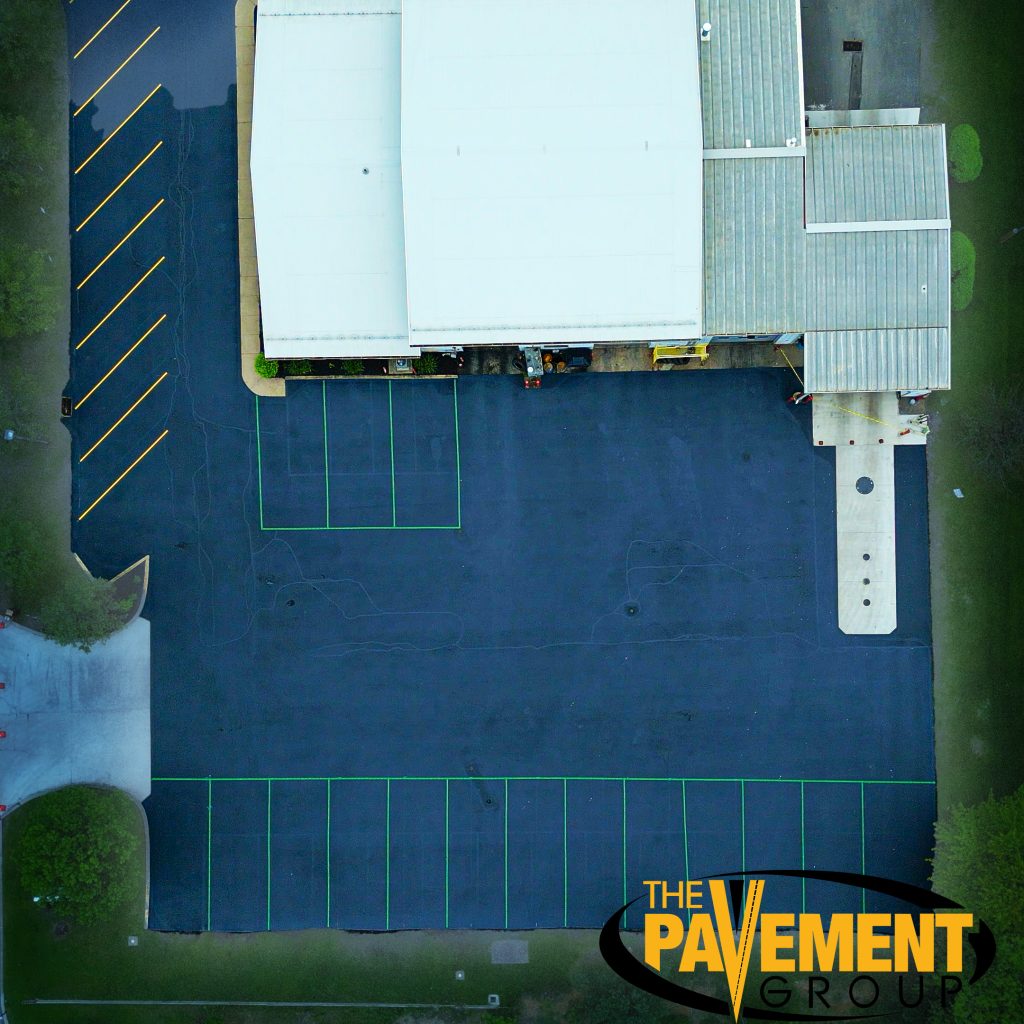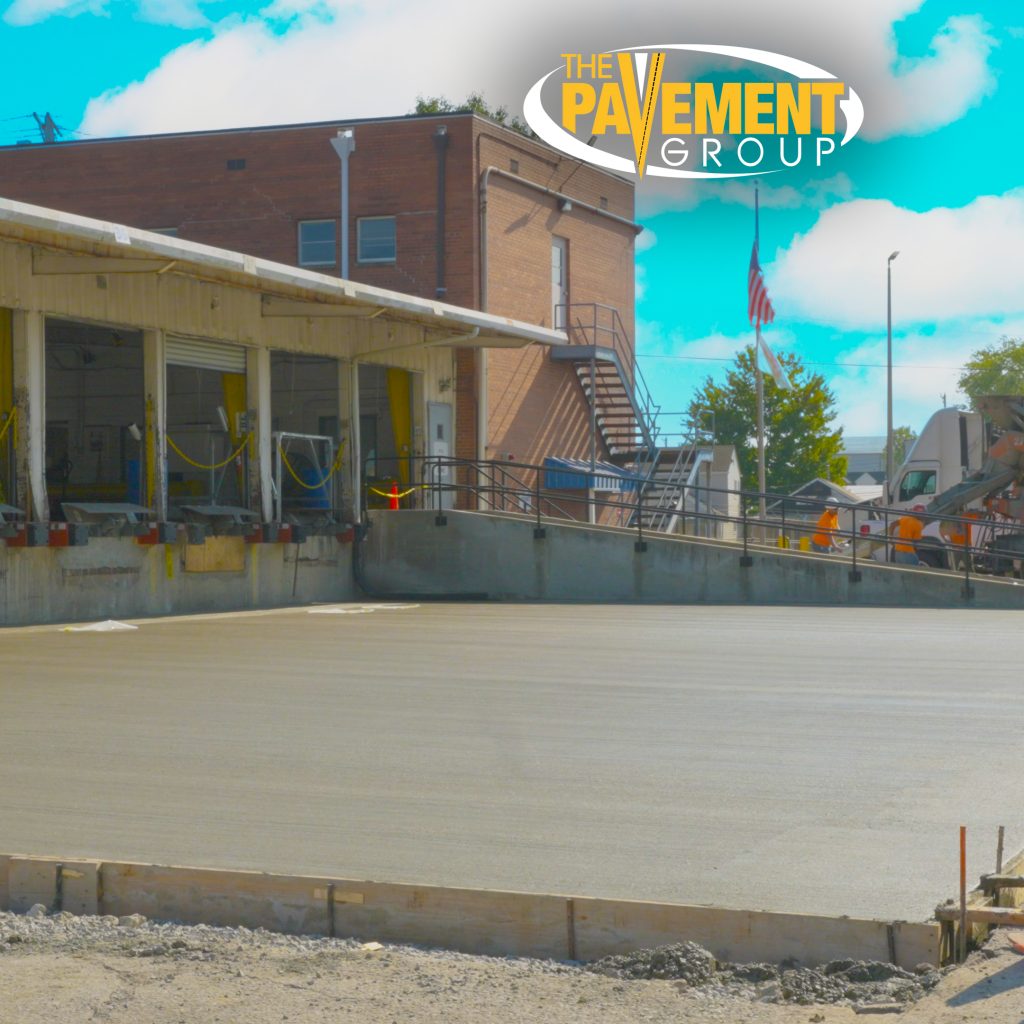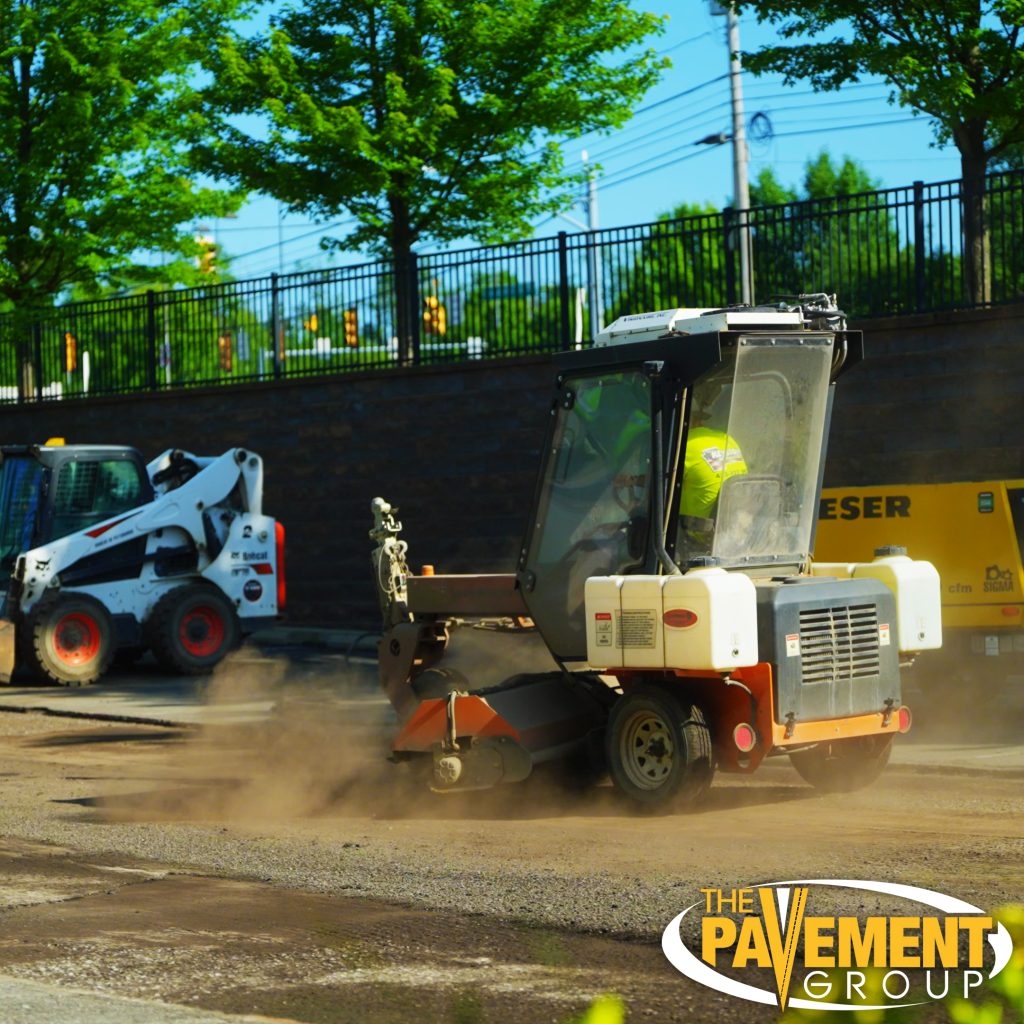Walk across any industrial site in Pittsburgh or Cleveland, and you’ll notice one thing right away. The pavement takes a beating. Heavy trucks roll in, forklifts move nonstop, and sometimes entire yards feel like highways in constant use. If that surface isn’t built to handle the load, you end up with cracks, potholes and unsafe conditions that cost more money than they should. At The Pavement Group, we’ve helped countless industrial property owners avoid these headaches by choosing the right asphalt paving solutions from the very beginning. This isn’t just about laying blacktop. It’s about creating Industrial sites with asphalt paving that lasts. Protects your investment and keeps operations running smoothly.
Why Asphalt Paving Matters for Industrial Sites
Industrial properties have unique challenges compared to residential driveways or even retail parking lots. You’re dealing with larger vehicles, higher traffic volumes and more stress on the pavement surface. That’s why asphalt is such a strong choice for these environments. It combines strength flexibility, and affordability.
Benefits That Make Asphalt Ideal
- Handles heavy machinery without crumbling under pressure
- Installs quickly so you don’t lose days of productivity
- Costs less than concrete while still delivering durability
- Repairs are straightforward keeping long-term expenses manageable
When you think about it asphalt is less of a cost and more of a smart business move.
Understanding Asphalt Thickness for Industrial Applications
One of the first questions we hear is “How thick should the asphalt be?” The answer depends on how the site is used. Thickness directly affects how long the pavement will last under constant pressure.
Recommended Thickness:
- Light-duty areas: 2 to 3 inches of asphalt is sufficient
- Medium-duty sites: 4 to 6 inches provide more stability
- Heavy-duty truck zones: 7 to 9 inches ensures long-lasting strength
We recently completed a project in Cranberry Township where the site had frequent 18-wheeler traffic. Without that thicker asphalt, the pavement would have failed within a year.
The Role of Base Preparation
Asphalt paving is only as strong as the base it sits on. Skipping this step is like building a house on sand.
Key Preparation Steps:
- Proper grading to channel water away
- Soil compaction to eliminate weak spots
- Laying a crushed stone or aggregate base
- Addressing clay or soft soils before paving
At a large warehouse site in Pittsburgh our crews found soft clay beneath the surface. If we had paved over it the asphalt would have shifted within months. Instead we stabilized the soil first and created a foundation that will last decades.
Drainage: The Factor Most People Forget
Here’s the truth. Even the thickest asphalt won’t last if water is allowed to sit. Drainage is the unsung hero of long-lasting pavement.
Smart Drainage Solutions:
- Sloping grades that guide water away from traffic areas
- Catch basins and storm drains to prevent pooling
- Permeable asphalt for specific sections that need extra drainage
Industrial sites often handle oils and chemicals too so poor drainage doesn’t just damage asphalt it creates safety hazards.
Why Maintenance Is Non-Negotiable
Think of asphalt like a car. If you ignore maintenance you’ll pay for it later. Industrial sites need consistent care to keep pavement safe and effective.
Maintenance That Pays Off:
- Sealcoating every 3–5 years extends lifespan
- Crack sealing keeps water from destroying the base
- Line striping improves safety and traffic flow
- Routine inspections catch issues before they grow
A Cleveland facility manager told us:
“I used to see paving as a one-time cost. After working with The Pavement Group I realized maintenance was the secret to saving money. Our lot has never looked this good or lasted this long.”
Asphalt vs Concrete: The Industrial Debate
It’s common to wonder whether concrete might be better. The truth is concrete has its place but asphalt usually comes out ahead for industrial sites.
Why Asphalt Wins
- Installs faster meaning less downtime
- Costs less upfront which frees up capital
- Repairs are easier and cheaper than concrete fixes
- Flexibility allows overlays instead of full replacements
Concrete can last longer in some situations but the downtime and high cost often make it impractical for fast-moving industrial operations.
Regional Concerns for the Northeast and Midwest
Asphalt in Pittsburgh or Erie doesn’t face the same conditions as in Arizona or Texas. Cold weather and freeze-thaw cycles make proper planning essential.
What to Keep in Mind
- Extra thickness helps resist cracking in cold climates
- Sealers that withstand salt are critical in snowy regions
- Drainage needs to handle snowmelt and ice runoff
- Scheduling paving during warmer months ensures proper curing
We know these challenges because we live and work here too. That local knowledge makes all the difference.
Sustainability and Asphalt Recycling
Industrial leaders are becoming more eco-conscious and asphalt is a surprisingly green option. It’s one of the most recycled materials in the world.
Eco-Friendly Advantages
- Reclaimed asphalt pavement (RAP) reduces landfill waste
- Lower energy usage compared to concrete production
- Recyclable nature lowers costs for future projects
- Potential to earn LEED credits for sustainability
By choosing recycled asphalt you’re not only saving money but also making a greener choice for your community.
Safety and Compliance at Industrial Sites
Beyond durability and cost there’s a safety factor. Smooth and properly maintained asphalt helps protect workers and vehicles.
Safety Benefits of Asphalt
- High skid resistance reduces accidents
- Bright striping organizes traffic flow
- Even surfaces prevent tripping hazards
- Compliance with ADA and OSHA standards where applicable
Testimonial
“I was managing an industrial site near Pittsburgh and our old asphalt was full of potholes. Trucks were constantly getting damaged and it became a daily complaint. The Pavement Group walked me through their entire process explained the importance of drainage and base preparation and delivered a final product that completely transformed our site. Now operations run smoother and our maintenance costs have dropped.” – Mark R., Industrial Facility Manager
Safety, Durability, and Uninterrupted Operations.
Industrial paving isn’t just about making a site look good. It’s about protecting your investment improving safety and keeping operations running without interruption. With the right approach asphalt paving can give you decades of reliable use. At The Pavement Group we combine local expertise, proven methods and a commitment to quality to deliver industrial pavement that stands the test of time. Contact us today.
Frequently Asked Questions
1. How thick should asphalt be for industrial use?
Industrial asphalt thickness depends on the traffic load. Light-use areas may only need 2 to 3 inches while heavy truck zones require 7 to 9 inches. Your paving contractor will evaluate your site and recommend the right thickness for long-term durability.
2. Is asphalt better than concrete for industrial properties?
Asphalt is generally faster to install and cheaper to repair than concrete. Concrete can last longer but it often requires long downtime that most industrial sites cannot afford. Asphalt provides flexibility durability and cost savings for busy operations.
3. How long does asphalt paving last on an industrial site?
With proper installation and regular maintenance industrial asphalt can last 20 to 30 years. Factors like climate heavy traffic and drainage all impact lifespan. Maintenance practices like sealcoating and crack filling extend its life significantly.
4. What type of maintenance is needed for industrial asphalt?
Industrial asphalt requires sealcoating every 3 to 5 years and regular crack filling. Line striping and inspections also keep the site safe and efficient. Skipping maintenance shortens pavement life and increases repair costs.
5. Why is drainage so important for asphalt paving?
Water is the biggest enemy of asphalt because it weakens the base layer. Proper drainage systems like slopes and catch basins prevent water damage. Without drainage even thick asphalt won’t last long.
6. Can asphalt be environmentally friendly?
Yes asphalt is one of the most recycled construction materials in the U.S. Using reclaimed asphalt pavement reduces waste and lowers project costs. It also helps companies meet sustainability goals.
7. How does climate affect asphalt in Pennsylvania and Ohio?
Cold winters and freeze-thaw cycles create stress on pavement. Thicker asphalt layers sealers that resist salt and proper drainage systems are essential. Local paving experts understand how to build surfaces that handle harsh climates.
8. How long does it take to install industrial asphalt?
Asphalt installs faster than concrete which means less downtime for your business. Most industrial projects can be completed in days instead of weeks. Exact timing depends on site size and weather conditions.
9. How does soil preparation affect asphalt longevity?
Proper soil preparation, including compaction, is crucial for asphalt longevity because it prevents settling and ensures a stable base, reducing the risk of cracks and pavement failure.
10. How do I know when it’s time to replace asphalt instead of repair it?
When cracks spread across the surface or potholes become widespread it may be time for full replacement. Repairs can only go so far before costs outweigh benefits. A professional inspection will help determine the right approach.


